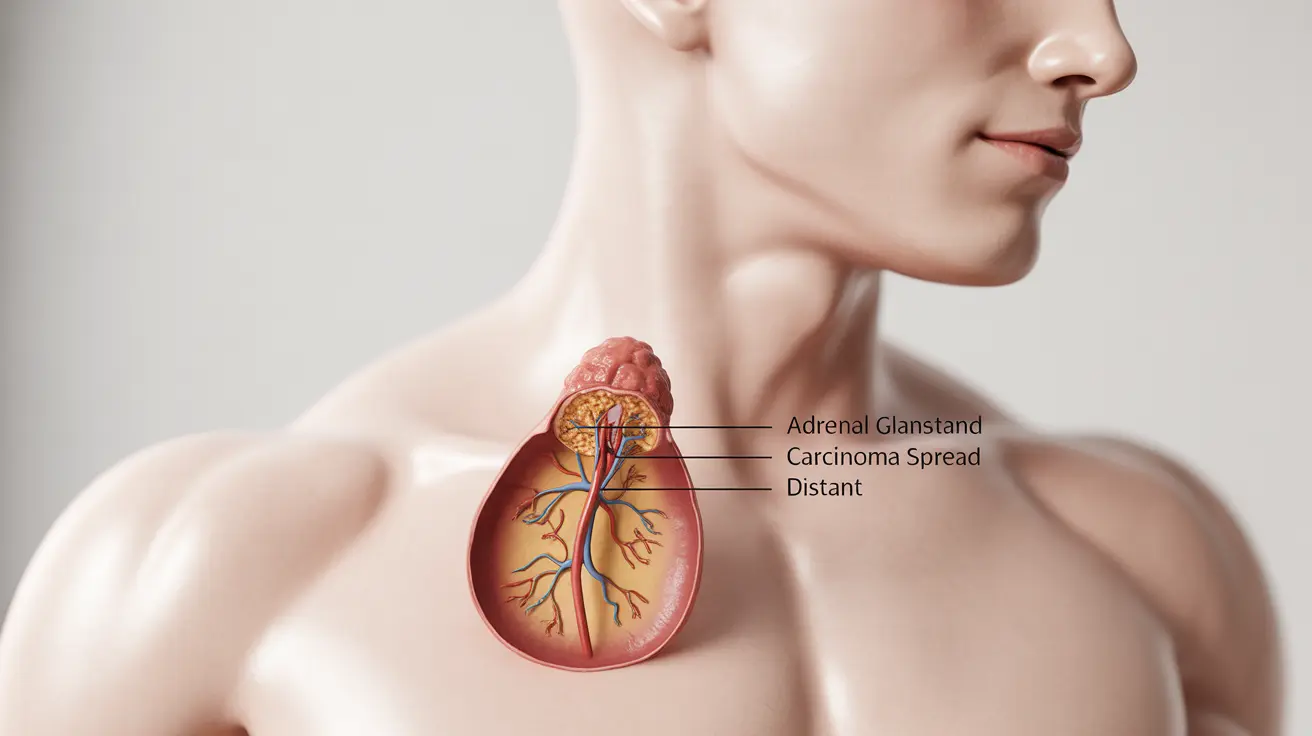Stage 4 adrenal carcinoma is an advanced form of cancer that begins in the adrenal glands and has spread to distant parts of the body. This rare but serious condition requires comprehensive medical attention and a thorough understanding of available treatment options. Understanding the symptoms, treatment approaches, and management strategies is crucial for patients and their caregivers.
This article provides detailed information about stage 4 adrenal carcinoma, including its symptoms, treatment options, and what patients can expect during their journey with this condition.
Common Symptoms of Stage 4 Adrenal Carcinoma
The symptoms of stage 4 adrenal carcinoma can vary significantly depending on where the cancer has spread and how it affects hormone production. Common symptoms include:
- Unexplained weight loss
- Severe fatigue
- Abdominal or back pain
- High blood pressure
- Muscle weakness
- Changes in body composition
Hormone-Related Symptoms
Since adrenal glands produce important hormones, stage 4 adrenal carcinoma often causes hormone-related symptoms such as:
- Mood changes
- Irregular menstrual cycles in women
- Unusual hair growth
- Changes in sexual function
- Blood sugar irregularities
Treatment Approaches for Stage 4 Adrenal Carcinoma
Treatment for stage 4 adrenal carcinoma typically involves a multi-modal approach, combining different therapies to manage symptoms and improve quality of life.
Surgical Options
While surgery may be more limited in stage 4, it might still be recommended to:
- Remove the primary tumor
- Address complications
- Reduce hormone production
- Manage metastatic sites in specific cases
Medication and Systemic Treatments
Various medications may be prescribed to manage both the cancer and its symptoms:
- Mitotane for hormone control and tumor treatment
- Chemotherapy drugs
- Targeted therapy medications
- Hormone-replacement therapy when needed
Managing Hormone Imbalances
Hormone management is a crucial aspect of treating stage 4 adrenal carcinoma. Medical professionals typically monitor hormone levels regularly and adjust treatments accordingly. This may include:
- Regular blood tests to check hormone levels
- Medication adjustments based on symptoms
- Lifestyle modifications to support hormone balance
- Supportive care for side effects
Clinical Trials and Research
Clinical trials can offer access to innovative treatments and contribute to medical advancement. Benefits of participation may include:
- Access to new therapeutic approaches
- Regular monitoring by research teams
- Contribution to medical knowledge
- Potential for better outcomes
Frequently Asked Questions
What are the most common symptoms of stage 4 adrenal carcinoma and how do they vary based on cancer spread? The most common symptoms include unexplained weight loss, severe fatigue, and abdominal pain. Symptoms vary depending on where the cancer has spread and can include bone pain if there are bone metastases, breathing difficulties with lung involvement, or neurological symptoms if the cancer spreads to the brain.
What treatment options are available for stage 4 adrenal carcinoma and how do they help improve quality of life? Treatment options include surgery, chemotherapy, targeted therapy, and hormone management. These treatments can help reduce tumor size, manage symptoms, control hormone production, and improve overall quality of life by addressing specific complications of the disease.
How does hormone imbalance from stage 4 adrenal cancer affect the body and what medications are used to manage these symptoms? Hormone imbalances can cause mood changes, weight fluctuations, and metabolic disruptions. Medications like mitotane and hormone replacement therapy are used to manage these imbalances and maintain normal bodily functions.
What is the expected prognosis or survival rate for someone diagnosed with stage 4 adrenal carcinoma? While stage 4 adrenal carcinoma is considered advanced disease, survival rates vary depending on individual factors, response to treatment, and overall health status. Modern treatments and clinical trials continue to improve outcomes for many patients.
How can participation in clinical trials benefit patients with metastatic adrenal cancer at stage 4? Clinical trials can provide access to cutting-edge treatments not yet widely available, offer hope when standard treatments are less effective, and contribute to the advancement of medical knowledge while receiving expert care from specialized research teams.




